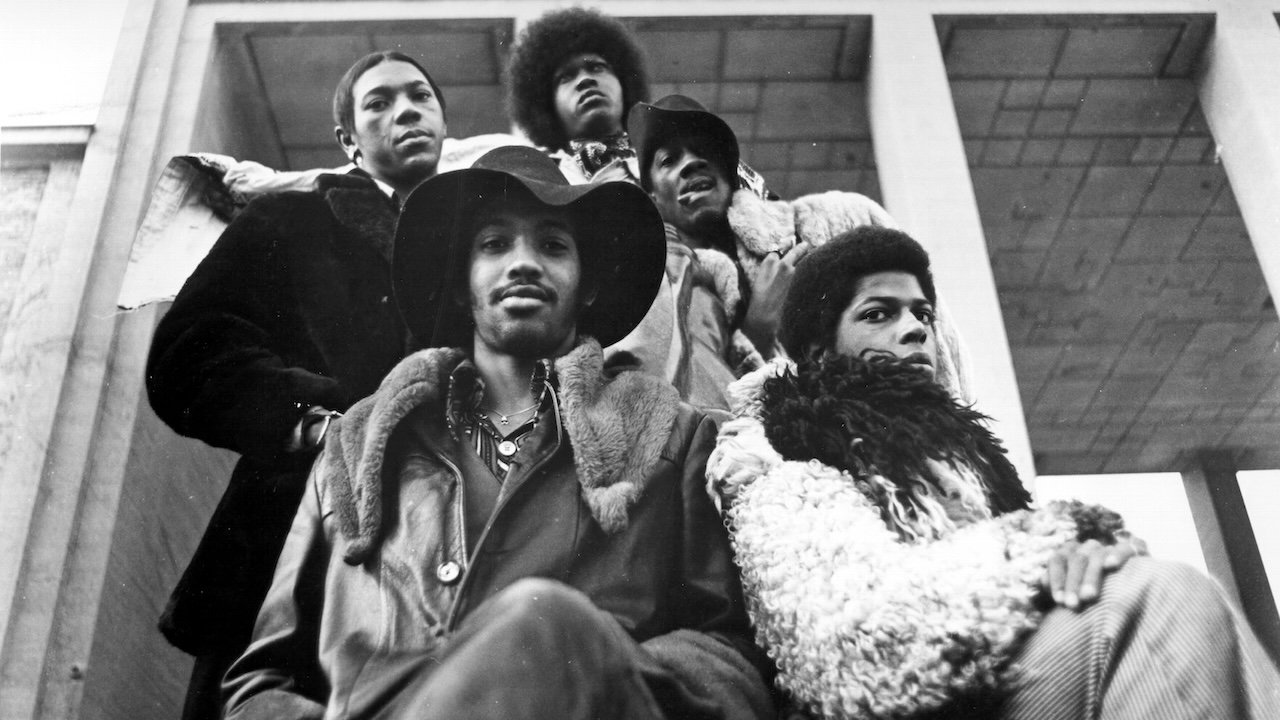Jason Momoa: ”I always knew I wanted to play bass. I wish I'd done this when I was young – but I’m making up for lost time”
Aquaman himself answers his bass heroes' questions and explains why low-end thunder is music to his ears
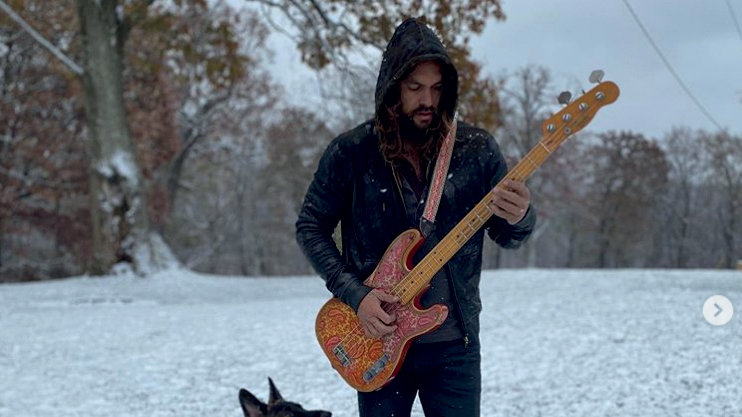
All the latest guitar news, interviews, lessons, reviews, deals and more, direct to your inbox!
You are now subscribed
Your newsletter sign-up was successful
When the music and cinema worlds collide, the results are often questionable. We can all name a long list of musicians who act and actors who play music, and the occasional gem aside, the crossover doesn’t usually work.
Keanu Reeves tried it, Steve Martin tried it, Jared Leto tried it – and while they all gave it their best shot, there’s often something about the actor/musician interface that doesn’t feel quite right.
When I interview the actor Jason Momoa, a meeting arranged by our mutual friends at Fender, there’s none of that slightly weird overlap. Momoa’s name – or at least, his face – is known to most people because he enjoyed a cinematic hit in 2018 as Aquaman, the DC Comics character, and before that as a warrior called Khal Drogo in HBO’s Game Of Thrones.
His film career is doing just fine, thanks, and for that reason he isn’t trying to build a second career as a musician. He doesn’t have an album to promote, or any other musical agenda to push, which is what’s so refreshing about this interview.
The man simply loves bass, using it as an outlet for creativity, honing his mental and physical focus with the instrument, and – as we all do – finding within the low notes a state of flow that takes him away from the everyday world.
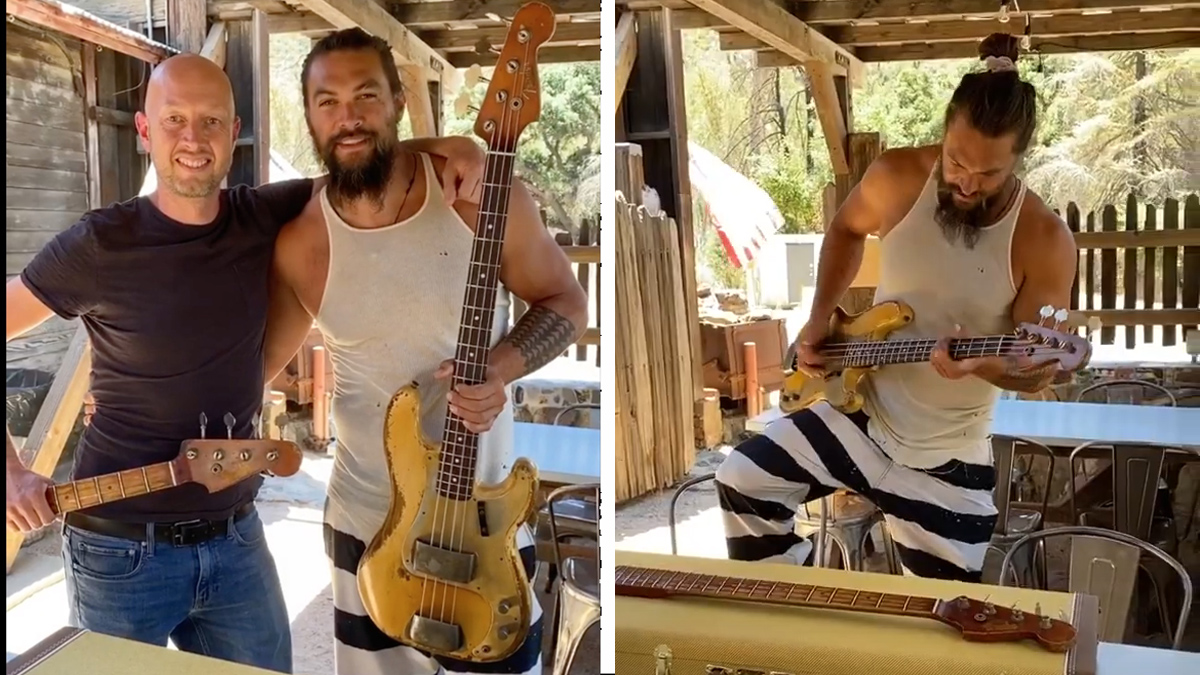
What’s more, Momoa is exactly like the rest of us when it comes to his bass heroes. Mention Les Claypool or Robert Trujillo to him, and he’s instantly excited, revealing the Primus and Metallica-loving fanboy behind the imposing 41-year-old.
It’s an education to witness this transformation, considering that Aquaman took over a billion dollars in box-office revenue, and that Momoa is presumably not that easy to impress. If you need evidence, ask him about the music he was into as a teenager – and watch him go.
All the latest guitar news, interviews, lessons, reviews, deals and more, direct to your inbox!
“Pantera, Rage Against The Machine, Primus, Black Sabbath, Red Hot Chili Peppers,” he tells us. “I really, really love John Frusciante and Flea, they’re really huge in my life. Tool, too. I listen to pretty much all of it. A lot of the music I search for is a lot more off the beaten path nowadays. I respect everyone out there doing it, because it’s so hard and so challenging, and I just try not to judge.”
You may have seen pictures of Momoa at musical events such as Slayer’s final show in 2019. He’s a headbanger to the core, hence our recruitment of the biggest names in that field to ask him questions on the pages you’re reading here, but it’s important to understand that he’s not just into metal.
As he says, “I’m really rooted, like one of my gods in music is Tom Waits, but having said that, my goddess is probably Ani DiFranco. I was raised with Miles Davis and Janis Joplin, and Godspeed You! Black Emperor is one of my all-time favorites, too.”
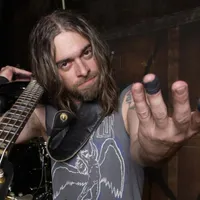
Rex Brown: “What type of sound do you go for? Fat and distorted, or clean and robust?”
Jason: “More distortion. I have a couple of pedals that I experiment with, but it depends on what I’m playing. If I’m doing something Claypool-sounding, or something that’s like Flea, I don’t have it distorted. I love it all, man.”
In bass terms, though, you only have to mention the late Cliff Burton of Metallica and he’s unstoppable. “Oh, let’s talk about Cliff!” he laughs. “The first song I’m dedicated to learning is [Burton’s 1983 solo piece] Anesthesia (Pulling Teeth). That’s the reason why I have my Rickenbackers, because of him. I fucking love Cliff.
“He was unbelievable. Did you see [Metallica’s new live album] S&M2, with the standup bass playing it? Oh my God. I had chicken skin, I was watching it over and over. I thought that was just so beautiful for Cliff. I’m all old Metallica, bro. I probably listen to Ride The Lightning and Kill ’Em All every week, if not every other day.”
It comes as no surprise that Momoa is close to Metallica’s current bassist Robert Trujilllo. “When’s that guy going to teach me how to play bass? Ha ha! He’s like my spirit animal, I love him. When I’m with Robert it’s like we both came out of the same cave. We’re the spitting image, and I absolutely adore him and his son and his family, they’re amazing.”
Another idol is Les Claypool of Primus, with whom he recently jammed during a visit to Claypool’s home.
“That was like a childhood dream,” he marvels. “We just hit it off. He was playing the drums and I was playing bass and going ‘Jesus Christ, man’, I was so nervous. Les is like fuckin’ God, so it was really hard to relax because he was just playing drums and I was supposed to start filling space and I was like ‘Oh my God, what’s going on?’ I look forward to the day when I can communicate on the bass on that level.”

David Ellefson: “I’m curious if a longer, 35” scale neck would work better with your larger hands?”
Jason: “I play on everything. I don’t let my hand size stop me from playing anything. Right now I’m doing mandolin and ukulele, so it’s always a bitch transferring from one instrument to the next, but I enjoy everything. I play bass every day, I play guitar every day, when I’m away from my family, and when I’m on the set, because I constantly like to be in my right side of my brain.”
Did Claypool advise Momoa about bass playing, I ask?
“Yeah, I gotta learn a lot of stuff, I taped a bunch that I’ll be learning right now. I can’t wait to gather more knowledge to be around him and just jam. We had a really great time together, which was a really big relief, because you don’t want to meet your heroes and then they’re fuckin’ assholes. We were having fun, just being fathers and family men. It was super inspiring.
“I asked him a lot of questions. I asked him what his hardest song is to play, and if he can still play it. The song DMV is his hardest; he has a very hard time playing it. I got the story behind why he did these really challenging things, and how he’s pissed because now he can’t do it on stage!”
Another meaningful aspect of this conversation is that Momoa is slightly out of his comfort zone. “It’s my first instrument interview,” he tells me right as he picks up the phone, which is important because – no disrespect intended to our colleagues in the film-magazine world – he’s now answering questions that he’s never answered before. This leads us very quickly into profoundly emotional territory.
“You know what?” he ponders when I ask him how he got into funk and metal bass playing. “I grew up really, really poor, and my mom worked frickin’ four jobs. I didn’t have any money, so I never could get a guitar or a bass. I come from a very small town in Iowa where there was no-one playing bass like that or listening to music like that.
“I discovered that music by going out to a skateboard park in Nebraska and hearing it. That cool counterculture of skateboarding helped me find those things, because I did not find them in my home town.”
It was my assistant’s birthday, and she really loves Tool, so I borrowed a bass from my buddy and we all played Sober for her. Right then, my passion for bass really exploded
A key moment in Momoa’s bass trajectory came fairly recently, he tells us. He was already a guitar player, but bass really came to the fore at this point.
“We were on the set of Aquaman. I always have instruments on the set, so my son was playing drums and my daughter was playing guitar. It was my assistant’s birthday, and she really loves Tool, so I borrowed a bass from my buddy and we all played Sober for her. Right then, my passion for bass really exploded. The moment I put it on, I could just feel the connection – and it was all over.”
He continues: “I always knew I wanted to play bass. After that I wanted to play standup, so I bought one and now it’s a passion for me, with how it makes me feel and how it sounds. I studied and studied and studied bass, and I was like ‘My God, I wish I would have done this when I was young.’ I wish that I had that opportunity –but I’m making up for lost time.”
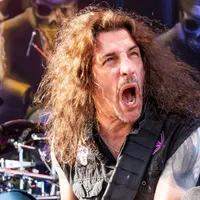
Frank Bello: “Do you get the same high when you’re jamming bass to a great song as you do when you finish acting a cool scene?”
Jason: “Definitely, but I really use bass as a tool to help me be calm, and to not sit in my mind too much. It’s much like a painter, probably – to get to disappear into a kind of space that isn’t like time. I love being in that state of mind.
“I feel like it’s ageless, and it’s fun, the more I can learn about music theory, which I’d like to spend more time with – learning that language. Bass is like a moving meditation. I love it and I love the way the bass sounds, even when it’s not plugged in.”
You won’t find much video online of Momoa playing bass on an actual professional stage, although there’s tons of him jamming casually backstage and on set. There is, however, some fan-filmed footage of him doing an impromptu gig or two with friends.
For such a well-known actor, it’s quite a revelation when he tells us that he found the experience very uncomfortable indeed.
“You know, I went on stage the other day with my friends and I was terrified. It’s funny, because I should be fine with playing on stage, but I was absolutely terrified getting on stage and playing with them, because I never really wanted to do that. Really – I was absolutely terrified. I’m not really a fan of it. But my friends, they love to have me up there, and I love supporting them, but I’m just like, ‘Oh, man... Stick to your craft.’“
Has he acted in theatre, and if so does that overlap with playing music?
“No, bro, no. I’ve never done theatre. I stay the fuck away from it. I don’t like being on stage, man. A lot of my friends are theatre guys and they love it, because it’s the actor’s medium, but I like the characters and the camera finding me, dude.”
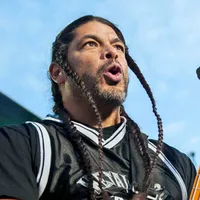
Robert Trujillo: “Jason, what is your earliest memory of getting excited about the sound of the bass guitar?”
Jason: “Actually, it’s funny when I think back on it. My very first album that I ever bought with my own money was The Uplift Mofo Party Plan by the Red Hot Chili Peppers. The second album that I ever bought was Sailing The Seas Of Cheese by Primus. For me, it was skateboarding that got me into those bands.
“I was a really big skateboarder back then, I was super, super into it. I’ve always been into it my whole life, and so that was my introduction to that particular kind of funk sound. When it came to listening to bass, everything was consumed by Flea and Claypool. There it is, that sound, and still to this day, both of those albums get played monthly. Even if they came out today they’d still hold sway.”
He goes on: “What I love about the film-making process is that it’s pretty much everything else – the music, the editing, producing, getting the money, seeing it all the way through. You work with the talent, you understand everyone’s positives and you bring them up to a higher level.
“I love the whole idea of film-making, but I would say acting is not at the top of my list in that whole process. When you really look at theater it’s definitely the actor’s medium. It’s 100 percent that.”
I’ve never done theatre. I stay the fuck away from it. I don’t like being on stage, man. I like the characters and the camera finding me, dude
He pauses to reflect, before adding: “You know, it’s sad to say that I haven’t challenged myself to that level yet. Maybe some day I will, but right now I’m writing all the things I want to do, and I’m making the movies and working with the directors that I want to, and the cinematographers that I want to. That one play where I go, ‘Oh I just have to do that’ just hasn’t happened in my life yet.”
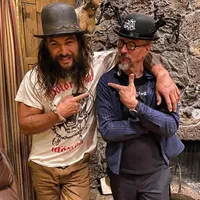
Les Claypool: “When I was young I was drawn to the bass because I thought guitar sounded thin and kinda wimpy. The bass, to me, was a much more sultry instrument. I figured by playing bass, it would help me get more ladies. In your experience, has playing bass helped you get the ladies?”
Jason: “Haha! Wow. He’s one of my idols, Les. You know, I found my lady [Momoa’s wife Lisa Bonet], and then found the bass. And now I stay with my lady – so there is no ‘ladies’. But you know what there is? There’s one woman and lots of basses.”
Les: “Sound travels 4.5 times faster underwater, therefore the clarity and definition of tone is much more precise. As Aquaman, what piece of music are you most drawn to when at depth?”
Jason: “Primus. One hundred percent.”
The bass players among you who enjoy a greater height than average will grasp Momoa’s next point pretty easily.
“I’m six-four, six-five,” he says. “I don’t like being looked at, and I get looked at a lot. On the stage you’re big, and you’re up there, and everyone’s staring at you – and I don’t like it. I walk into a room and I slouch a bit.”
Maybe a period of rehearsal would help, I suggest, which is the right thing to say, because Momoa cheers up.
“Listen,” he says confidently, “that was my first time playing a song on stage, and I’m sure more practice will make me feel really comfortable. Ultimately, if I practised with my friends, and actually did something where I could participate instead of being on the spot, it would be better.” The gig he’s talking about does sound a touch stressful.
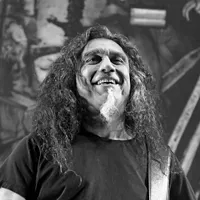
Tom Araya: “Would you ever take a break from acting to do a full album cycle tour with a band?”
Jason: “Oh man. A lot of my friends are musicians and I love them, and I feel like it’s fine for them to be actors, but I don’t know, when I see actors being musicians I’m like, ‘Oh my God’. It’s just like ‘Ugh...’ It never really works out.
“It’s all good, and I would never want to say ‘I’ll never do anything’. I enjoy playing up there with my friends if they’re raising money for a charity, of course, because it’s always good to help – but I feel very out of place up there.”
“Yeah! They were like, ‘You’re gonna come up on stage, otherwise we’re gonna chant your name and everyone’s gonna make you come up, and it’s just gonna be awkward’. I didn’t want to bring any more tension to the situation, so I was like ‘Guys, I don’t wanna go up’.
“But they’re like ‘You’re gonna come up’, so I was like ‘Fuck!’ and I started having a panic attack. You wouldn’t think I’d have a panic attack, but yeah, I get anxiety about it. So if I did practise, it would be beautiful. I mean, you never know.”
I tell him that maybe he should take a year off acting and tour with a band, maybe calling it Jason and the Argonauts. Why not?
“Ha ha! You know what? I’m gonna do that, and you know what, maybe in a year you’re gonna call back and go ‘Jason, guess what, you’re an actor that plays in a band’ and I’ll be like ‘Oh fuck, I’m a cliché. Goddammit. We’re Jason Momoa and the Clichés!’”
Joel McIver was the Editor of Bass Player magazine from 2018 to 2022, having spent six years before that editing Bass Guitar magazine. A journalist with 25 years' experience in the music field, he's also the author of 35 books, a couple of bestsellers among them. He regularly appears on podcasts, radio and TV.


